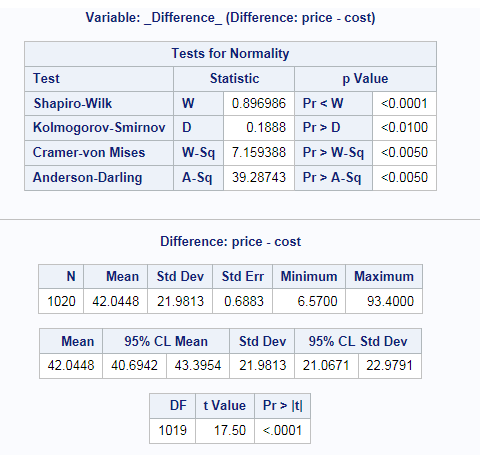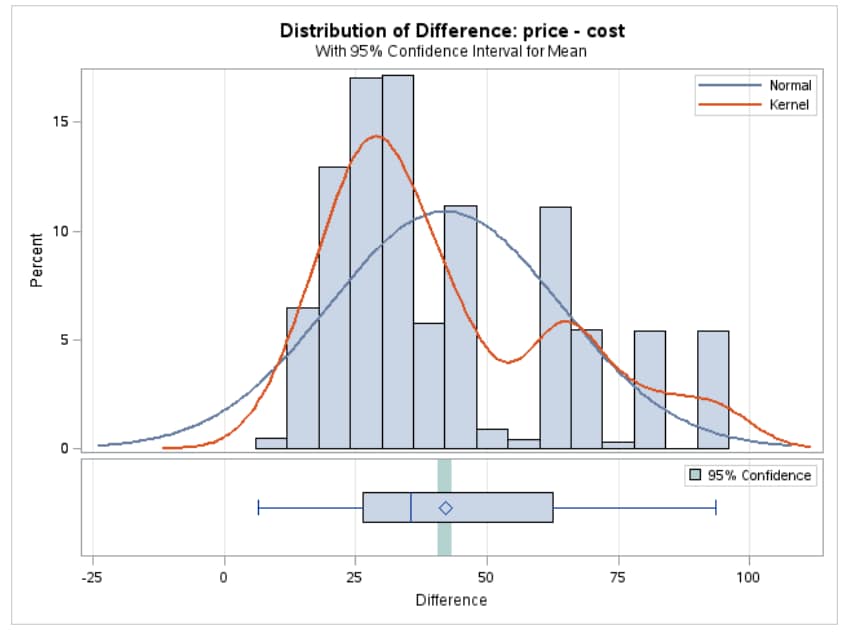T Tests Task: Paired t Test
About the Paired t Test Task
A paired t test compares the mean of the differences in the observations to a given number, the null hypothesis difference. The paired t test
is used when the two samples are correlated, such as two measures
of blood pressure from the same person.
To compare n paired
differences to a value m, use  , where
, where  is the sample mean of the paired differences and s2d is
the sample variance of the paired differences.
is the sample mean of the paired differences and s2d is
the sample variance of the paired differences.
 , where
, where  is the sample mean of the paired differences and s2d is
the sample variance of the paired differences.
is the sample mean of the paired differences and s2d is
the sample variance of the paired differences.
To run a paired t test,
open the T Tests task. From the T test drop-down
list, select Paired test.
Note: You must have SAS/STAT to
use this task.
Example: Determining the Distribution of Price – Cost
In this example, you want to compare the means of differences in price and cost in
the Sashelp.Pricedata data set. The null hypothesis for this test is 30.
To create this example:
Assigning Data to Roles
To run a paired t test,
select Paired test from the T
test drop-down list. Assign columns to the Group
1 variable and Group 2 variable roles.
The task compares these two variables. Because paired t tests
are performed by subtracting each value of the Group 2
variable from the corresponding value of the Group
1 variable, the designation of the variables matters.
Setting Options
|
Option Name
|
Description
|
|---|---|
|
Tests
|
|
|
Tails
|
specifies the number of sides (or tails) and direction of the statistical tests and
test-based confidence intervals. You can choose from these options:
|
|
Alternative
hypothesis
|
specifies the value of the null hypothesis.
|
|
Normality Assumption
|
|
|
Tests for
normality
|
runs tests for normality that include a series of goodness-of-fit tests based on the empirical distribution function. The table provides test statistics and p-values for the Shapiro-Wilk test (provided the sample size is less than or equal to 2000), the Kolmogorov-Smirnov test, the Anderson-Darling
test, and the Cramér-von Mises test.
|
|
Nonparametric Tests
Note: This option is available
only for a two-tailed test.
|
|
|
Sign test
and Wilcoxon signed rank test
|
generates the results
from these tests:
|
|
Plots
|
|
|
Histogram
and box plot
|
creates a histogram and box plot together in a single panel, sharing common X axes.
|
|
Normality
plot
|
|
|
Agreement
plot
|
plots the second response in each pair against the first response. The mean is shown as
a large bold symbol. A diagonal line with slope=0 and y-intercept=1 is overlaid. The location of the points with respect to the diagonal line reveals
the strength and direction of the difference or ratio. The tighter the clustering
along the same direction as the line, the stronger the positive correlation of the two measurements for each subject. Clustering along a direction perpendicular
to the line indicates negative correlation.
|
|
Response
profile plot
|
creates a plot where a line is drawn for each observation from left to right that connects the first response to the second response. The mean
first response and mean second response are connected with a bold line. The more extreme
the slope, the stronger the effect. A wide spread of profiles indicates high between-subject
variability. Consistent positive slopes indicate strong positive correlation. Widely
varying slopes indicate lack of correlation. Consistent negative slopes indicate
strong negative correlation.
|
|
Confidence
interval plot
|
creates a plot of the confidence interval for the means.
|
Copyright © SAS Institute Inc. All rights reserved.







